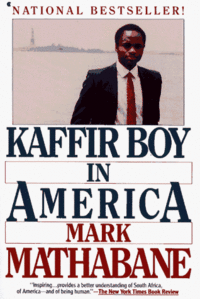Take a photo of a barcode or cover
challenging
dark
emotional
hopeful
informative
reflective
sad
tense
slow-paced
challenging
informative
slow-paced
I read this as the first book for a two person “book club” so I still have to sort out a lot if my thoughts on it (i.e. consolidate pages of notes).
A good book for someone not familiar with what apartheid did (which would be many people when it was first published in 1986 AND many South Africans today). But in intending the book primarily as a tool of education and awareness rather than memoir the story sometimes felt like a collection of simple parables rather than a view into the horror and complexity of Mathabane’s situation. All characters speak with the same voice. His mother gives long moralistic soliloquies to inspire. His white friends provide voices through which he can speak about his achievements. His father is painted as a fool towards whom his superior education can be measured. The loss of these character’s inner lives and difficult decisions grates.
At times I got pulled in to the difficulty of his decisions, especially around tennis. But Mathabane does not explore this fully, so eager is he to paint clear caricatures of write and wrong. His families experience with the shitty pass situation is Kafka-esque but also relies on others describing the situation rather than him explaining his experience with it.
Despite all of this the themes in the book are way bigger and more important than good or bad narrative and dialogue. Apartheid was a blight on humanity and you cannot read this and think otherwise. The disturbing thing is, while apartheid has ended, the inequality still stands. And the ignorance of the living conditions of black people in townships remains. Instead of segregation being dictated by race, it is now dictated by socioeconomic class. But one’s socioeconomic status derives so strongly from the inequality set up with apartheid that in many real ways segregation of opportunity, access to basic services and education remain.
A good book for someone not familiar with what apartheid did (which would be many people when it was first published in 1986 AND many South Africans today). But in intending the book primarily as a tool of education and awareness rather than memoir the story sometimes felt like a collection of simple parables rather than a view into the horror and complexity of Mathabane’s situation. All characters speak with the same voice. His mother gives long moralistic soliloquies to inspire. His white friends provide voices through which he can speak about his achievements. His father is painted as a fool towards whom his superior education can be measured. The loss of these character’s inner lives and difficult decisions grates.
At times I got pulled in to the difficulty of his decisions, especially around tennis. But Mathabane does not explore this fully, so eager is he to paint clear caricatures of write and wrong. His families experience with the shitty pass situation is Kafka-esque but also relies on others describing the situation rather than him explaining his experience with it.
Despite all of this the themes in the book are way bigger and more important than good or bad narrative and dialogue. Apartheid was a blight on humanity and you cannot read this and think otherwise. The disturbing thing is, while apartheid has ended, the inequality still stands. And the ignorance of the living conditions of black people in townships remains. Instead of segregation being dictated by race, it is now dictated by socioeconomic class. But one’s socioeconomic status derives so strongly from the inequality set up with apartheid that in many real ways segregation of opportunity, access to basic services and education remain.
challenging
dark
emotional
hopeful
informative
medium-paced
dark
emotional
informative
inspiring
medium-paced
I liked this book a lot. It reminded me of [b:Native Son|15622|Native Son|Richard Wright|http://photo.goodreads.com/books/1166676407s/15622.jpg|3159084] and [b:The Autobiography of Malcolm X: As Told to Alex Haley|92057|The Autobiography of Malcolm X As Told to Alex Haley|Malcolm X|http://photo.goodreads.com/books/1171240741s/92057.jpg|47400] except the setting was South Africa. This book tells the story of Johannes(pardon my spelling) who lives in a township(slum,ghetto, whatever you wanna call it) outside of the city of Johannesburg. It depicts Johannes's life over about 10 years. Throughout the book , he is often called "kaffir" which is just another way of saying "nigger". After reading this book I got a better idea of apartheid. I learned that it was a harsher form of America's segregation. The only thing negative I have to say about this book is that out of the blue Johannes was starting to be referred to as "mark". Out of the blue. And then I kind if wanted him to have a girlfriend because all he kept talking about was tennis.
emotional
informative
sad
tense
medium-paced
This book is graphic and super heavy. I read a lot of nonfiction books in my life that deals with someone’s traumatic upbringing, but this one is now at the top of my list. Several times I had to close the book, sigh, and sit in silence.
This is an autobiography of a boy who grew up in Alexandria Township, Johannesburg, South Africa during apartheid. A victim of segregation, poverty, and brutality, he learned how to survive under the harsh conditions during the 1960s and 70s.
Once I finished chapter 2, I was hooked. I felt like I was there with him. Although he did not hide his frustration and anger, I loved how he remained positive throughout. He was determined to be successful and make it out of there. Although I was familiar with apartheid, he made me see what it was like for the average black person living there. This is a must read and one hell of a story. Powerful!
I actually don't know what to rate this because I read it and high school and I don't remember it very well, but a friend and I were just discussing South Africa and trying to remember what the name of the book was that we read. I found it so here it is Wendi!
challenging
dark
emotional
hopeful
inspiring
sad
medium-paced
dark
informative
tense
medium-paced







